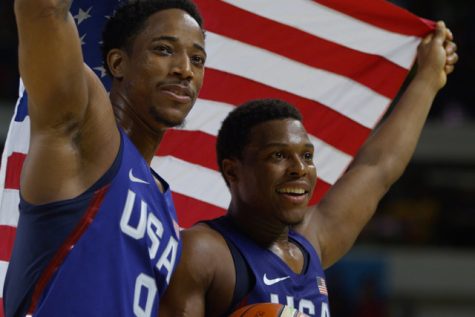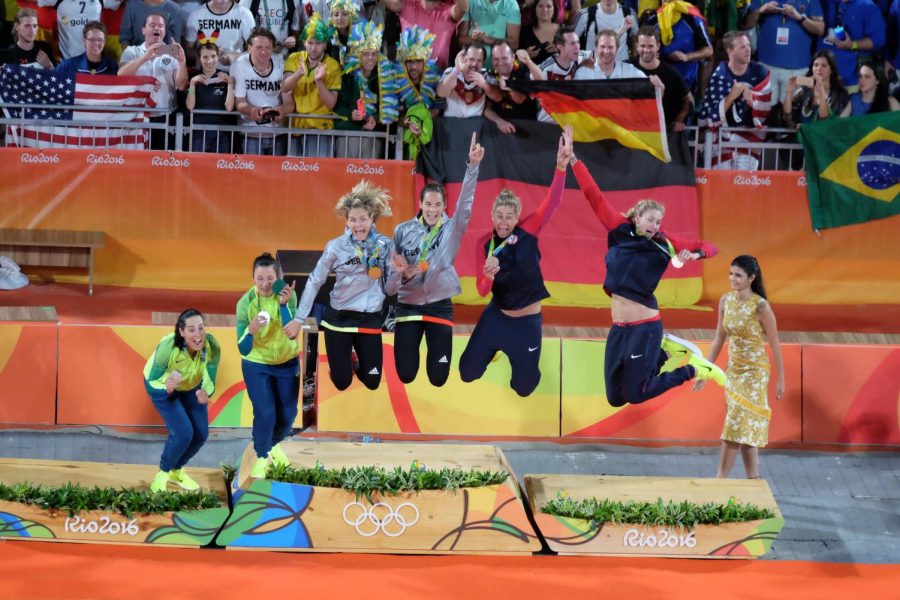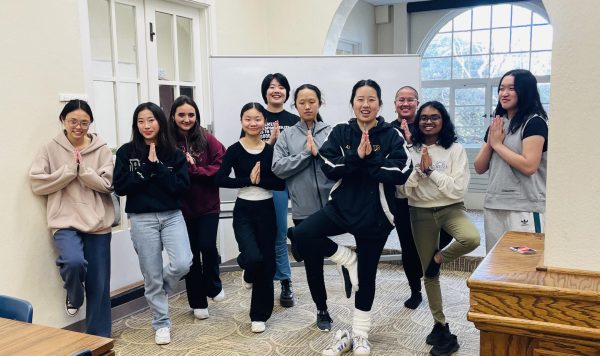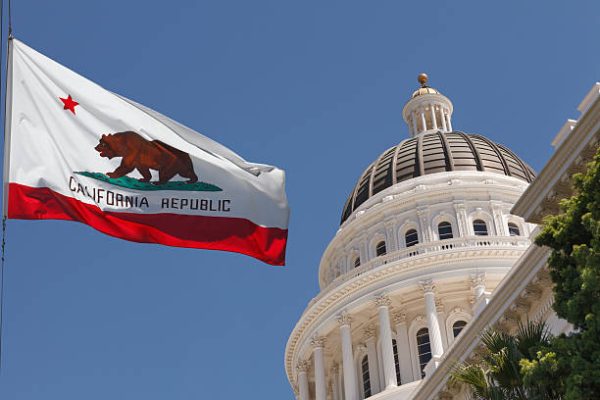From Moscow to Beijing
Should the government have the right to boycott the Olympics?
This is what the Olympics should be all about: athletes from different countries coming together to not only compete and bring pride to their nation but have fun and enjoy each other’s company. Pictured are the beach volleyball medalists at the 2016 Rio Summer Games.
“A dream is a wish your heart makes,” Cinderella sang to her bird friends in the Disney classic. It is a goal that slowly becomes feasible through years of hard work and dedication. For some, that dream might be getting into an Ivy League school. For others, owning a business of their own tops that list. But for most athletes, there are no bigger dreams than becoming an Olympian. It’s a dream that buries its seed in childhood, and with years of brutal training coupled with a sprinkle of luck to peak just at the right time and stay injury free, can be reached by only the fortunate few. And imagine having it all taken away in an instant with a governmental decision to boycott.
Olympic boycotts are nothing new. The first mention of such can be traced all the way back to 332 BCE when an athlete from the city of Athens was caught trying to “fix” his match. Modern day boycotts, however, are most often caused by political conflicts. Although some are used to address specific actions taken by a particular nation, others have simply taken place as diplomatic retaliation.
The biggest boycott in the history of the modern Olympics was the 1980 Moscow Summer Games. In an attempt to take a stand against the Soviet invasion of Afghanistan, Former President Jimmy Carter decided against sending a delegation to participate in the Games and many U.S. allies followed suit. According to Time Magazine, out of the sixty-seven nations that did not participate in 1980, at least forty-five of the countries withdrew because of Carter’s actions. I wish I could tell you a lot of good came out of it. However, it unfortunately did not alter history, nor save lives on the battleground.
As a matter of fact, with all the political pressure and the sacrifices the athletes made, the Soviets occupied Afghanistan for eight more years after the 1980 Moscow Games. Ultimately, it was the mounting number of lives lost and the exhaustion of resources that finally pushed the Soviet leader Mikhail Gorbachev to sign a peace accord with Afghanistan in April of 1988. So what did this boycott gain politically? Nothing. What did this boycott cause emotionally? Everything. Hundreds of athletes’ lives were wrecked, and thousands more lives of those who were close to those athletes were dramatically affected.
As if all this was not enough, what followed four years later is even more ironic: the U.S.S.R. and thirteen of its Eastern European comrades boycotted the 1984 Los Angeles Olympics. Even though the Soviets cited fear of their athletes’ security as the official reason for the boycott, it is widely understood that this boycott was simply a tit-for-tat and nothing more. This blatant retaliation to the 1980 boycott made very little splash politically, yet another generation of athletes suffered the unnecessary consequences.
Canadian gymnast Elfi Schlegel remembered that suffering all too well, as one of the best gymnasts in the world in 1980. Having started gymnastics at seven years old, she instantly knew that it was the right sport for her. By the time she was twelve, she had been named to the Canadian Women’s National Team and started to compete all over the world. This led to Schlegel’s winning of two golds at the Commonwealth Games and becoming a front runner to represent Canada at the Moscow Games in 1980. Everything seemed to be in line for the eager and talented sixteen-year-old. But in a blink of an eye, the opportunity to compete for her country at the Olympics was taken away from her. “It was devastating and confusing. I didn’t understand what [politics] had to do with gymnastics and the Olympic Games,” Schlegel expressed to me.

Director of Athletics Coach Paula Conway added, “[going through a situation like boycotting the Olympics] is almost like going through death.” This is not at all an exaggeration. Many athletes put everything else in their lives on hold for a once in a lifetime chance to compete at the Games. They are up at the crack of dawn to squeeze in a practice before heading to school, and when we are out with our friends grabbing a boba tea after school, they are back at the rink, the pool, the field, the court, whatever you name it, for their second practice session of the day. Some have to be homeschooled and forgo having a social life altogether just to accommodate their training schedule and keep the dream alive; not to mention the hundreds of thousands of dollars their families spent on training, and the countless hours spent driving them to practice and competitions. So to have it all taken away without any personal input feels like a death sentence. It makes you feel gutted, numb, bitter, and angry. And on top of it all, people did not outwardly talk about mental health back in the days. Athletes were assumed to be strong, and simply told to move on. What an impossible task that must have been.
As a result, many athletes’ careers came to an abrupt end due to lack of outlet and motivation. Some left the sport that they loved simply in the hope of forgetting it all and leaving everything in the past. Schlegel said, “I pray that we will never come to that again… The [amount of] lives that [the boycott] affected is hard to describe.”
And yet, the word “boycott” seems to come up every few years. The U.S. government has considered boycotting three out of the eight most recent Olympic games (2008 in Beijing, 2014 in Sochi, and now 2022 in Beijing again) citing China’s human rights issues and Russia’s well known doping problem. This is not to say it is not important to fight for what we believe in. However, by taking a stand against one injustice, it does not give anyone the right to create another and then simply view it as the collateral damage for a greater good.
During our interview before her sixteenth trip to the Olympics, award winning journalist Andrea Joyce put it best: “Since the athletes were never consulted on which cities should be awarded the honor of hosting the games, why should they face the consequences?” No one should be forced to compete; however, on the flip side, no one should be forced to withdraw either. Those who participated in the 1936 Berlin Games were not there because they agreed with the Nazi regime.
People often think that taking a stand on an issue means it has to involve a lot of people and make a huge amount of noise. However, the loudest message and the biggest political statement during the 1968 Mexico City Summer Games came from a silent gesture. Known as the Black Power salute, the image of Tommie Smith and John Carlo on the Olympic podium with their black gloved hands over their heads is the most memorable moment from those Games. They had initially intended to boycott the Mexico City Olympics due to the unfair treatment of Black Americans and racial inequality, but the two eventually chose to compete, believing that greater opportunities for activism globally would arise — and they were right. Taking a stand on the track with millions watching was proven to be so much more impactful.
Star swimmer Lucius Brown (‘22 at The Bishop’s School and ’26 at Yale University), who competed in the Olympic Swim Trials in Omaha after his junior year in high school, recalled that iconic moment from ‘68 when I spoke with him. He expressed that “while it is always important to take a stand in what you believe, athletes aren’t to blame [for the political issues between governments], and therefore, shouldn’t be punished.”
It seems to be a no-brainer that instead of using athletes as pawns, and robbing them of the chance of a lifetime, world leaders need to come up with a much more effective way to take a stand. I cannot imagine that the decision makers are not aware that boycotting the games does not actually make many real changes in the countries they aim to punish. But it sure is the cheapest way to take a stand with the least amount of legal headaches.
Why not force CEO of Tesla Elon Musk to shut down his showroom in XinJiang, the very province the US government banned imports from due to human rights abuses? Because he has rights. Why not consider sending the athletes to the Games but not let any US broadcaster televise the event? Because Comcast will probably sue for damages. But is that not a much better way to block the public relations propaganda from the host countries, and therefore make a bigger impact? And if broadcasting companies stop paying the International Olympic Committee (IOC) billions for Olympics coverage rights due to the host countries tarnished public image, then is it possible for better host countries to be selected?
“I hope our government and other sports leadership do all they can to ensure that those Olympic dreams are continued to be made available for every young kid who dares to dream. [Boycotting] should be the absolute last resort and not the first to be considered,” David Marsh, an American swimmer, Head U.S. Olympic Women’s Swim Coach in Rio 2016, and 1980 Olympic hopeful, told me. “Sure, some are celebrities, but many athletes train in relative obscurity their entire lives… just for that one moment. It seems unfair that athletes would pay such a huge price for something totally out of their control,” Joyce added.
With the White House announcing their choice of a diplomatic boycott of the 2022 Winter Games in Beijing, many were relieved. Even though some may have felt that not sending governmental officials was not the strongest message we could have sent, one has to admit that it was the most clever compromise we had. Having the freedom to choose is what we, as Americans, are extremely proud of. It is what sets us apart from many other nations in the world. Therefore, participation in an event such as the Olympic Games should be a personal choice; it should be respected as a basic right; and no government should be allowed to take it away from you.
Innocent athletes should never be the sacrificial lamb in political disagreements. It is not right. It is not fair. And it needs to stop. Now. So let the Games begin.

Sydney Chan is an Editor-in-Chief for The Tower dedicated to discovering unique stories and bringing them to life through her pieces. She especially loves...
















